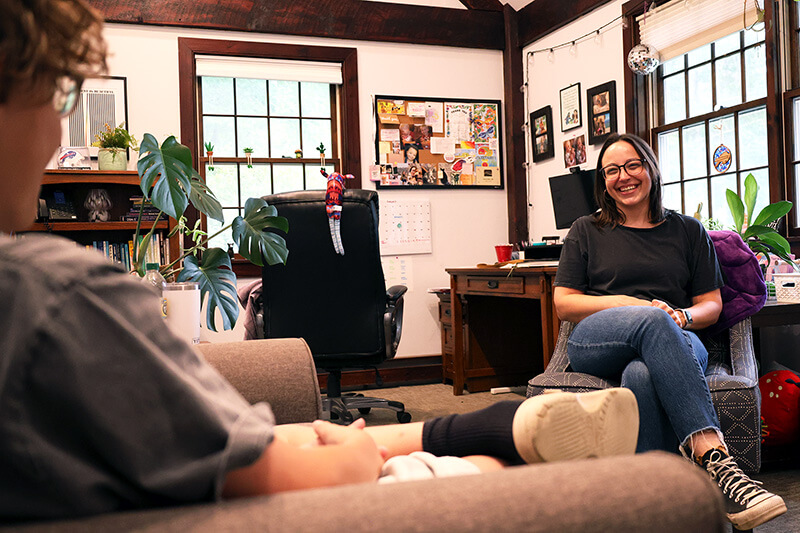
Program Overview
Mountain Valley is designed specifically for adolescents and young adults whose lives are severely impacted by anxiety and related disorders, such as OCD. We apply a combination of evidence-based therapies—including exposure and response prevention (ERP), cognitive behavioral therapy (CBT), and acceptance and commitment therapy (ACT)—throughout each resident’s highly personalized three-phase treatment journey. Our innovative integration of licensed occupational therapists ensures that insights gained in therapy are effectively translated into practical life applications.
Set on a beautiful riverside campus in the tranquil Connecticut River Valley of New Hampshire, near Dartmouth College, Mountain Valley provides an environment where residents build lifelong friendships while supporting each other in healing and growth. We also maintain a strong resident and parent alumni network who remain connected and credit Mountain Valley with changing—and, in many cases, saving—their lives and futures.
Program Phases
The Mountain Valley program is structured by our narrative treatment framework entitled “The Journey Home.” This narrative framework, born from a clinical approach known as “narrative reasoning,” harnesses the therapeutic power of storytelling and uses the arc of the story to create a clear beginning, middle, and end to treatment. These three distinct phases—or chapters—of treatment are used to help residents, their families, and our team structure the treatment process and make meaning out of the events that unfold during one’s therapeutic journey. While each resident’s story is unique, the program identifies common themes and a shared narrative reflective of Joseph Campbell’s renowned “Hero’s Journey” framework and the principles of Exposure and Response Prevention (ERP) therapy. Both frameworks emphasize the individual’s journey into the unknown, facing innermost fears, and emerging transformed with newfound wisdom and strength. Inspired by these parallels, Mountain Valley has designed a phased treatment model aimed at guiding residents through the process of confronting and conquering their fears to rediscover their true selves.
Phase 1 – “The Departure” (Days 1–30*)
Marks the beginning of the resident’s journey. During this phase, residents respond to the initial call for change, leaving behind familiar patterns and embracing the transition into treatment. Emotions vary widely as residents settle into the program, establishing connections with mentors, reflecting on personal motivations, and setting goals. Despite initial enthusiasm, many residents encounter internal resistance, making it challenging to fully engage in the therapeutic process. Thus, the phase focuses on building a foundation for deeper work, adjusting to the program’s structure, and identifying areas for growth. The phase concludes with a ceremonial Initiation Fire, symbolizing the resident’s official entry into the program.
Phase 2 – “The Adventure” (Days 30–60*)
Represents the heart of the resident’s journey. Here, residents confront their fears head-on, engaging in exposure exercises designed to challenge and expand their comfort zones. Each challenge serves as a stepping stone, fostering personal growth and resilience. Through this process, residents gain valuable insights into themselves and their capabilities, culminating in a significant ordeal that serves as a pivotal moment in their treatment narrative. By conquering their innermost fears, residents emerge transformed, equipped with newfound knowledge and confidence. The phase concludes with a symbolic ice bath ceremony, symbolizing the resident’s courage and commitment to living an exposure-based lifestyle.
Phase 3 – “The Transformation” (Days 60–90*)
Residents integrate their learnings into everyday life and prepare for the transition beyond the program. This phase focuses on solidifying changes, fostering independence, and embodying the transformed self. Residents take on leadership roles within the community, serving as mentors to others and sharing their wisdom. The goal is to ensure that the changes achieved during treatment endure long after the resident’s transition out of the program. Through reflective exercises and preparation for the next steps, residents redefine their identities and create action plans for embodying their desired selves. The phase concludes with a ceremonial graduation, celebrating the resident’s achievements and marking the completion of their journey.
Phase 4 – “The Return” (Post Graduation)
This optional, separately billed phase bridges the gap between Mountain Valley and daily life, offering thirty days of structured guidance to support a confident and intentional transition. Residents maintain wellness routines, apply exposure principles to real-world challenges, and strengthen external supports with mentors, clinicians, and families. Parents receive individualized coaching and responsive care coordination to help sustain progress. In the first two weeks, residents engage in daily check-ins, goal setting, and twice-weekly mentor sessions, while parents receive hands-on support. During the final two weeks, the structure gradually lightens—maintaining meaningful connections through weekly sessions and coaching calls—allowing residents and families to step forward with clarity, confidence, and continued support.
*Our phases are designed to take place over the course of 30-35 days, for a typical program length of approximately 90 days. However, each journey is unique and, although the phases remain the same, the time to complete each phase will be adjusted to the individual as they face the obstacles that come their way and complete their own “Journey Home.”
Schedule

Weekend activities:
Residents participate in diverse, seasonally specific programming on Saturdays and Sundays. Extended off-campus cultural, arts and recreational activities such as trips to nearby Dartmouth College, local ski slopes and trails, seasonal adventure activities such as canoeing and spelunking, and sports are just a small part of the weekend programming.
Curriculum
Mountain Valley Treatment Center’s therapeutic curriculum is designed to help residents overcome their fears and reclaim a sense of control in their lives. Central to this approach is exposure and response prevention (ERP) therapy, the gold standard for treating anxiety and OCD. ERP encourages residents to face and gradually reduce their fear—and their responses to fear—in a safe, supportive environment. This evidence-based foundation is complemented by cognitive behavioral therapy (CBT), acceptance and commitment therapy (ACT), and occupational therapy (OT), which together support residents in developing practical skills for daily functioning, emotional regulation, and increased independence. Integrated with experiential learning, recreational therapy, and mindfulness practices, Mountain Valley’s holistic program of care empowers residents to confront anxiety head-on, fostering the confidence necessary to “fear less” so they can be more.

Questions? Get in Touch
Give us a call or submit a question to learn more about
Mountain Valley Treatment Center.